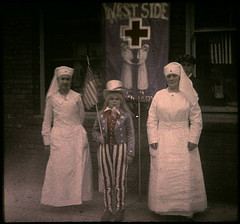
Image by George Eastman House via Flickr
There seem to be a lot of people searching for rules for medical offices. I’ve never heard of such rules, but since people are looking for them, I thought I’d write some.
- Medical offices are professional workplaces and staff need to dress, speak, and purport themselves professionally.
- Patients are customers and customer service should be paramount. Give all patients the utmost respect and practice compassion, compassion, compassion.
- If it didn’t get documented (on paper or electronically), it wasn’t done. If it didn’t get documented, you can’t charge for it.
- HIPAA. First of all, please spell it correctly. One P, two As. Secondly, know what it means and make it so!
- Never enter an exam room without knocking.
- Confirm patient identity (name, date of birth, etc.) before giving injections, taking specimens or performing a procedure.
Image via Wikipedia
- Remove very sick or very angry patients from the front desk immediately. Take the sick ones to exam rooms and take the angry ones to the manager’s office.
- Do not use medical jargon with patients. If they don’t know what you’re talking about, they might be too intimidated to ask.
- Wash your hands. Often. No matter what you do in the practice.
- The office should be CLEAN, fresh and up-to-date. No dying plants, no magazines more than 9 months old, no dust bunnies behind the doors, no stained seating or carpets.
- Train staff to apologize, and to apologize sincerely.
- Complaints from patients and staff need to be addressed in 2 weeks or less.
- Medical equipment is to be maintained and tested annually for safety and performance.
- Once a medical record is finalized, the only changes to a paper record are single line strike-throughs with corrected information and initials, or addendums. There are no changes to electronic records, only addendums.
- Patients don’t understand insurance. Be the expert.
- Shred confidential practice paperwork and patient-identified information on-site.
- Keep medications (including sample medications) in locked cabinets and use a good inventory system to log the use and replacement of stock.
- Strive to meet patients at their communication level. Use graphics, translated materials and interpretive services when needed.
- Don’t expect patients to be on time for their appointments when the provider isn’t.
- Don’t make copies from copies.
- Give everyone the benefit of the doubt. There’s always more to the story. Okay, this is really a rule for life in general, but it works in medical offices too.
Leave a comment and tell me what rule you would add.
For more medical office rules, read “Ten Golden Rules for Your Medical Office Staff.”



